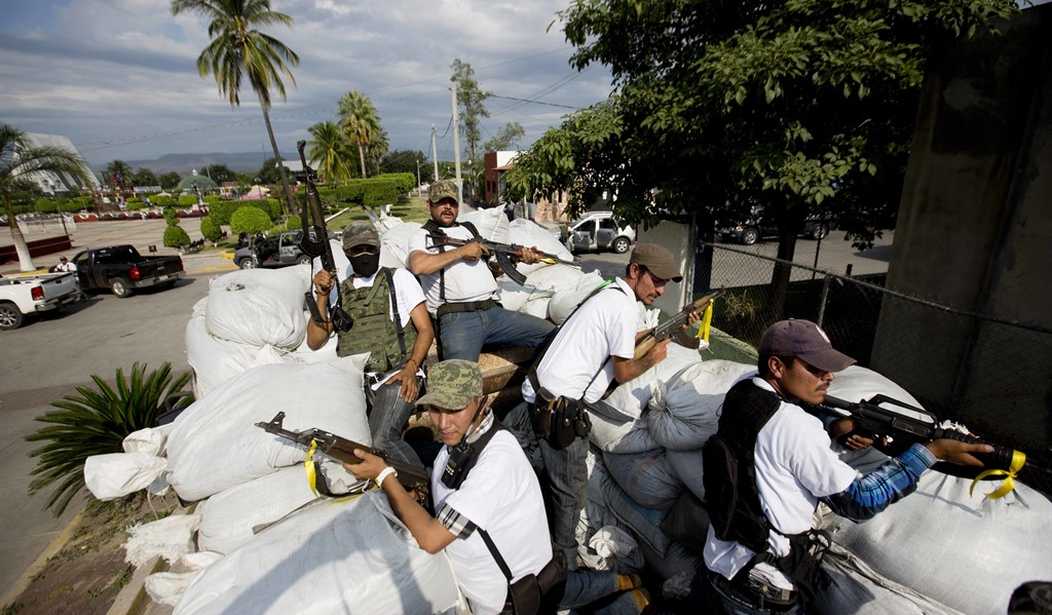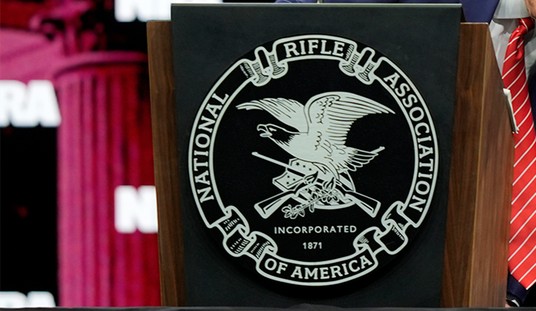While the government of Mexico has launched a $10-billion civil suit against U.S. gun makers accusing them of fueling cartel violence, the administration of Andrés Manuel López Obrador is taking a much softer approach to fighting the cartels themselves. In fact, López Obrador has called for a strategy of “hugs, not bullets” to combat cartel violence, but many Mexican citizens who have to live under the oppressive thumb of an incipient narco-state are choosing to fight back instead.
As smoke curled from neighboring buildings that had been ransacked and torched the day before, a couple of thousand Indigenous people armed with makeshift weapons gathered around city hall to hear their leaders speak.
Led by a new self-defense militia called “El Machete,” the people had descended from their mountain villages on the town center the previous day to expel the collaborators of a criminal gang who they say has terrorized their community for years.
As outnumbered state security forces stood by, the attackers raided homes and businesses and tied up 21 suspected gang members.
At least a dozen buildings—their walls spray painted with the rallying cries of “Long live El Machete” and “Narcos out”—were completely razed, scattering debris across town.
“We left the homes of the narcos and assassins the same way they left our family members when they killed them or stole their land,” said a young man masked in a camouflage balaclava speaking from the balcony of city hall.
Keep in mind that the members of “El Machete” are violating Mexico’s gun control laws just as the cartels are. And why are they doing so? Because they have a human right of self-defense, even if their government wants to make it nearly impossible for them to legally own a gun.
“In the absence of the state, and with the presence of organized crime, the community was left with no other choice but to form its own self-defense group,” said Father Marcelo Pérez, a local Indigenous priest and human rights activist.
As VICE News lays out, an organized crime syndicate known as Los Herrera has been firmly in control of the town of Panthelo for years now, and have even sought to use violence and threats of reprisals to sway elections.
In the lead up to the vote, Los Herrera carried out a campaign of intimidation on behalf of their allies in the Party of the Democratic Revolution, or PRD as it’s known for its Spanish initials, said Pedro de Jesús Faro, director of the Center for Human Rights Fray Bartolomé de las Casas which is in the area’s main city, San Cristóbal de las Casas. “If [the people] did not vote for the PRD, they would face serious consequences, even death.”
The threats were not empty. In early May, Los Herrera allegedly murdered an Indigenous man in his cornfield in order to make an example of him and spread fear, according to residents. VICE World News is reserving the identity of the residents of Pantelho it interviewed because those who have raised their voices in the past have often been killed.
Within days, armed residents of the village where the man was killed and alleged members of Los Herrera clashed in a shootout. Two of the gang were reportedly killed.
That was the beginning of El Machete, according to VICE, but even after that skirmish with Los Herrera the violence continued. Last month the brother of a popular priest was murdered, which led to more fighting between El Machete and Los Herrera, culminating in the militia clearing the syndicate out of Pantelho on July 26th.
“Here there is no security, no peace, no tranquility, only fear, cries, terror, extortions and intimidations, not to mention corruption,” said the El Machete spokesman who addressed the crowd. “For that reason, on July 26 we entered the town center to take justice into our own hands, to raid the homes of the assassins and narcos.”
The Indigenous people of Pantelho have demanded that authorities annul the local election and recently held an election of their own to choose their own non-partisan leaders.
But Mexico’s president, Andrés Manuel López Obrador, appears unlikely to be willing to recognize the new authorities, because he has expressed skepticism about the Indigenous people’s motivations. “Either it’s a question of political maneuvering in the region, control by bosses, or it’s criminals,” he said shortly after El Machete went public.
But addressing the crowd on July 27, the El Machete spokesman challenged López Obrador. To the cheers of the crowd, he posed a question.
“Do the lives of Indigenous people not matter?”
It’s a fair question to ask of the Mexican president, and the answer, at least according to some critics, is that those lives only matter when it’s politically convenient. At the same time, López Obrador has demonstrated a curious tendency to release high-level cartel officials from their prison sentences. Even when the president talks tough about the cartels, as he did this week when a drug cartel threatened to kill a journalist over her reporting, his administration has been unable or unwilling to follow through with its promises to protect the people from cartel violence.
“I completely condemn those threats,” Mr. López Obrador said during his morning news conference. “I reiterate my solidarity with this journalist, Azucena Uresti, and to all journalists, with the guarantee that our government will always protect those who carry out this job.”
In reality, the government has done little to protect them. Journalists are regularly murdered in Mexico because of their work, giving added credibility to the death threat from one of the country’s most violent drug cartels.
Two reporters have been killed for their work so far this year while 15 more are missing, according to the Committee to Protect Journalists, an international advocacy group. Since 1994, the group said, nearly 60 journalists have been murdered for their work in Mexico.
“Mexico is the most dangerous country for journalists in the Western Hemisphere, and it has had that status for a very long time,” said Jan-Albert Hootsen, Mexico representative for C.P.J. “The Mexican state is completely unprepared and ill-equipped to deal with this problem, and there’s also a lack of political will from the Mexican government to adequately protect journalists and combat impunity.”
A lack of political will to go after the cartels, but López Obrador is more than willing to go after U.S. gun makers (with the help of the American gun control lobby), even though some supporters of the lawsuit are willing to acknowledge that the president himself is helping to fuel Mexico’s cartel violence with policies that bear a striking resemblance to the Defund the Police movement here in the United States.
Mexico’s security budget is one of Latin America’s lowest in terms of GDP, according to the Stockholm International Peace Research Institute: just 0.6%, compared with 1.4% in Brazil, 1.9% in Chile and 3.4% in Colombia — all safer countries.
In more than half of Mexico’s states, police officers don’t earn a living wage or hold the professional certification supposedly required by law. Many have to buy their own uniforms, gas and even bullets. Computers, forensic labs and a host of things that enable officers to do their jobs are scarce.
Lopez Obrador has redirected these meager resources away from police to the military. He disbanded the civilian-led Federal Police to make way for a military-controlled National Guard. He has upped the military budget by $2.5 billion while zeroing out dedicated funds for municipal police officers and slashed outlays for community policing and other programs shown to improve citizen security.
Mexico’s justice system is similarly foundering. The impunity rate for murders tops 95%, and that for other violent crimes is also frighteningly high. Nevertheless, the government deprioritized the implementation of a more transparent oral trial-based justice system, leaving the transition incomplete. Despite spectacular attacks on public officials and dozens of political murders in the run-up to June’s midterm elections, the government has cut funding for the investigatory organized crime unit within the Attorney General’s office.
Honestly, if López Obrador gave a damn about the people he supposedly represents, the best thing he could do would be to drop his civil suit against gun makers, introduce a repeal of Mexico’s repressive gun control laws, and work to legally put U.S.-made firearms in the hands of those citizens who want to protect themselves and their families from the multinational criminal syndicates that are a major threat to their security and safety. Since that’s not going to happen, expect to see more stories of self-defense groups illegally arming themselves to protect their communities in the face of AMLO’s inaction.









Join the conversation as a VIP Member